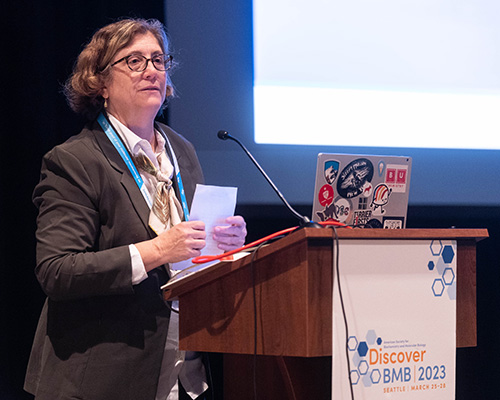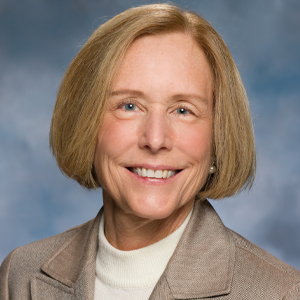Talking about women in biochemistry and molecular biology
To increase awareness of the American Society for Biochemistry and Molecular Biology activities, I’ve been talking to chairs of the committees that steer the society’s initiatives.
I recently spoke with Susan Baserga of the Women in Biochemistry and Molecular Biology Committee. Susan holds both M.D. and Ph.D. degrees and is an endowed professor of molecular biophysics and biochemistry and a professor of genetics and therapeutic radiology at the Yale School of Medicine. She has chaired the WIBMB Committee since its founding in 2019.

This conversation has been edited.
AS: When did you become an ASBMB member — and what attracted you to the society?
SB: I’ve been a member for a very long time, about 20 years. I got more involved in the ASBMB when in 2016 I won the society’s William C. Rose Award for biochemistry and mentoring. I figured if an organization was nice enough to give me a prize, I should become more involved. I was a member of the Public Affairs Advisory Committee for six years and then co-founded the Women in Biochemistry and Molecular Biology Committee.
AS: Can you tell me about your research, which was recognized with the Rose Award?
SB: I’m an RNA biologist. We study how ribosomes are made in the cell nucleolus. We study ribosomes both at the basic science level and also the health implications for human diseases resulting from defects in ribosome biogenesis, called ribosomopathies. Also, ribosomes are very important as they drive cancer. We have a separate program that's looking for small molecules that can inhibit ribosome biogenesis in the nucleolus as a new way to treat cancer.
AS: What was the origin of the WIBMB Committee and your role in its founding?
SB: It was started by three of us: me, Kelly Ten Hagen who's a senior investigator at the National Institutes of Health and Karen Allen who's chair and professor of chemistry at Boston University. We decided that the ASBMB would benefit from having a committee that would advocate for women in biochemistry and molecular biology. We presented it to the ASBMB Council over several sessions, and it was officially approved in 2019. We sprung off what was already an active community that had been running the women’s networking dinner at the society’s annual meeting every year for a number of years. Thus, the committee was relatively easy to launch, because it was a natural extension of what was already going on.
AS: What does the committee provide to women members that they don’t find elsewhere in the society?
SB: We’ve been very organic in the things that we’ve chosen to work on. We were the first society to show the movie “Picture a Scientist,” which is a documentary about barriers faced by women in science. Our society sponsored one of the directors, Sharon Shattuck, to participate in a webinar. The film is fabulous. The webinar was held during the pandemic when we were all stuck at home, and it was a superb event.
We've done a lot of different things of interest to our members. Our theme in 2022 was learning how to say no and the price women pay for what are called “nonpromotable” tasks, particularly in academia. We were very lucky to have Laurie Weingart, one of the authors of a new book called “The No Club,” join us for a webinar. She presented a lot of evidence-based analysis of how women say yes too often to tasks that really don't pay off in the long run.
AS: What’s on the horizon for future events?
SB: In 2024 we’ll have a webinar on negotiation strategies for women. One of our new committee members, Mary Jo Ondrechen from Northeastern University, is part of an organization called COACh. It's an organization of women out of the University of Oregon that teaches women how to be better negotiators. We're currently working on the details and are very excited to bring this topic and the expertise of COACh to the ASBMB membership.
AS: How do WIBMB committee members contribute to the goals of the committee?
SB: That's a very important question. When I started this committee, I envisioned that it wouldn't just be about me as a leader of the committee. Rather, it would be about having everyone take on the leadership role that they are interested in. So, instead of me running all these webinars and doing all these things, it's our committee members who do it. We have very active participation from all of the different WIBMB members to the extent that they want to be involved, and it really goes a long way toward building and showcasing leadership skills.
AS: In what ways can ASBMB members interact with WIBMB?
SB: Please come to Discover BMB and attend the women's networking dinner. It's a fabulous experience. There are usually 250 people at the event, both women and men. The food is usually outstanding. We'll have a panel discussion in March that will focus on networking strategies for women. Also, l started a new wellness walk. The day after the dinner we go for an hour-long walk. Last year, we had about 60 people walking in Seattle and it was a huge success. We’re looking forward to seeing you in San Antonio this year.
Enjoy reading ASBMB Today?
Become a member to receive the print edition four times a year and the digital edition monthly.
Learn moreFeatured jobs
from the ASBMB career center
Get the latest from ASBMB Today
Enter your email address, and we’ll send you a weekly email with recent articles, interviews and more.
Latest in Opinions
Opinions highlights or most popular articles

Women’s health cannot leave rare diseases behind
A physician living with lymphangioleiomyomatosis and a basic scientist explain why patient-driven, trial-ready research is essential to turning momentum into meaningful progress.

Making my spicy brain work for me
Researcher Reid Blanchett reflects on her journey navigating mental health struggles through graduate school. She found a new path in bioinformatics, proving that science can be flexible, forgiving and full of second chances.

The tortoise wins: How slowing down saved my Ph.D.
Graduate student Amy Bounds reflects on how slowing down in the lab not only improved her relationship with work but also made her a more productive scientist.

How pediatric cataracts shaped my scientific journey
Undergraduate student Grace Jones shares how she transformed her childhood cataract diagnosis into a scientific purpose. She explores how biochemistry can bring a clearer vision to others, and how personal history can shape discovery.

Debugging my code and teaching with ChatGPT
AI tools like ChatGPT have changed the way an assistant professor teaches and does research. But, he asserts that real growth still comes from struggle, and educators must help students use AI wisely — as scaffolds, not shortcuts.

AI in the lab: The power of smarter questions
An assistant professor discusses AI's evolution from a buzzword to a trusted research partner. It helps streamline reviews, troubleshoot code, save time and spark ideas, but its success relies on combining AI with expertise and critical thinking.

